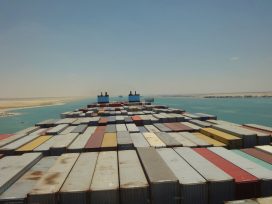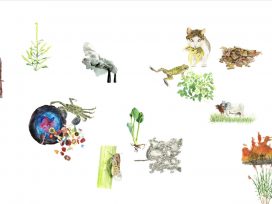The biblical myth of the Tower of Babel, to be found in Genesis XI, verses 1-9, is a familiar one. Here is the translation in the Douai Bible produced at the English College in Douai in 1609:
And the earth was of one tongue and of the same speech. And when they removed from the east, they found a plain in the land of Sennaar, and dwelt in it. And each one said to his neighbour: Come, let us make brick, and bake them with fire. And they had brick instead of stones, and slime instead of mortar. And they said: Come let us make a city and a tower, the top whereof may reach to heaven: and let us make our name famous before we be scattered abroad into all lands. And the Lord came down to see the city and the tower, which the children of Adam were building. And he said: Behold, it is one people, and all have one tongue: and they have begun to do this, neither will they leave off from their designs, till they accomplish them in deed. Come ye, therefore, let us go down, and there confound their tongue, that they may not understand one another’s speech. And so the Lord scattered them from that place into all lands, and they ceased to build the city. And therefore the name thereof was called Babel, because there the language of the whole earth was confounded: and from thence the Lord scattered them abroad upon the face of all countries.
This is the King James version of 1611:
And the whole earth was of one language, and of one speech. And it came to pass, as they journeyed from the east, that they found a plain in the land of Shinar; and they dwelt there. And they said to one another, Go to, let us make brick, and burn them thoroughly. And they had brick for stone, and slime they had for morter. And they said, Go to, let us build us a city and a tower, whose top may reach unto heaven; and let us make us a name, lest we be scattered abroad upon the face of the whole earth.
And the Lord came down to see the city and the tower, which the children of men builded. And the Lord said, Behold, the people is one, and they have all one language; and this they begin to do; and now nothing will be restrained from them, which they have imagined to do. Go to, let us go down, and there confound their language, that they may not understand one another’s speech. So the Lord scattered them abroad from thence upon the face of all the earth: and they left off to build the city. Therefore is the name of it called Babel: because the Lord did there confound the language of all the earth: and from thence did the Lord scatter them abroad upon the face of all the earth.
And the Jerusalem Bible of 1966:
Throughout the earth men spoke the same language with the same vocabulary. Now as they moved eastwards they found a plain in the land of Shinar where they settled. They said to one another, “Come, let us make bricks and bake them in the fire”. For stone they used bricks, and for mortar they used bitumen. – “Come,” they said “let us build ourselves a town and a tower with its top reaching heaven. Let us make a name for ourselves, so that we may not be scattered about the whole earth.”
Now Yahweh came down to see the town and the tower that the sons of man had built. “So they are all a single people with a single language!” said Yahweh. “This is but the start of their undertakings! There will be nothing too hard for them to do. Come, let us go down and confuse their language on the spot so that they can no longer understand one another.” Yahweh scattered them thence over the whole face of the earth, and they stopped building the town. It was named Babel therefore, because there Yahweh confused the language of the whole earth. It was from there that Yahweh scattered them over the whole face of the earth.
I could go on to quote any number of translations of this episode in Genesis, or add a variety of translations into Italian, Spanish, German or French, for example. I could turn the myth of Babel, translated into several languages and several forms, into a little stack, a new tower of paper.
The myth tells how the sons of Adam refused to fill all the surface of the earth in accordance with divine command. They presumably felt that, if they had done so, they would have been in danger of becoming lost, fragmented, isolated. So, instead, they decided to “make a name for themselves”. In this we can perceive the tradition that exists in the Middle East (and beyond) whereby a name signifies, materialises and establishes existence. In order to do so, they wished to stay together. Living together in a small area meant that they needed to build a town, and at its centre would be a tower whose top would reach to heaven. They would flout the authority of the throne of God by encroaching upon it with what they had built! Refusing to disperse, living in a town, building a tower that would reveal to them the secrets of heaven: in all this we can recognise those multi-level stepped towers, known as ziggurats, that were a marvel of Mesopotamian culture (although they are not actually our subject today).
The first act of those men who all speak the same language and make up a single people constitutes their revolt against the creator: they refuse to separate from one another to go and populate the whole earth. And so the creator says to himself: “So they are all a single people with a single language! This is but the start of their undertakings! There will be nothing too hard for them to do.”
And this is what leads God to confound their languages (one of the possible etymologies of Babel). As soon as men ceased to understand each other, they dispersed. Confusion of tongues is then the means by which the lord of men restores them to obedience, to populating the earth, to their human condition. Unity of language means togetherness, revolt, the longing for power and the desire to know; a multiplicity of languages means the end of construction, the end of the desire for power and knowledge, dispersal, obedience.
In our consciousness, in our memories, the Tower of Babel signifies the diversity of languages. But this is not actually so: it was unity of language that caused the building of the tower and the multiplicity of languages that brought it to an end, that left it unfinished through centuries of legend.
Why have we reversed the linguistic significance of the Tower of Babel? I do not know. I do not even know anything about all the works that may have been concerned with this phenomenon. But let me at least put forward a thought.
The Tower of Babel is associated with knowledge: with the storming by men of heaven and of the unseen power enthroned there.
And for us, knowledge in turn is associated with languages, in their diversity and their difficulty. In Europe, since the philological revolution, knowledge has meant speaking one or more vernacular languages, reading Latin, Greek or Hebrew, in short, being able to write whatever can be written. Knowing means knowing different things: diversity is one of the essential characteristics of knowledge. For us, there is no such thing as single knowledge.
Only one body of knowledge seems to be homogeneous: language itself. You know or speak, or read, or write Italian, English, German and so on. In line with the nation state, with the biblical myth, we are held together by a particular kind of oneness: our language.
And yet language too appears to be multifarious: the three translations of Genesis given above are a clear illustration of this. The Hebrew of the Bible can be understood in a diversity of ways: English translates the Hebrew variously. Every language has within it a variety of languages, what linguists call “levels of language”: popular speech, received, formal, learned, technical language, the jargons used in trades and professions, the street language of young people or minorities.
“The Tower of Babel does not exist”: human beings never did have but a single language.
But our attachment to the myth of the Tower of Babel and our mistaken view of it speaks volumes. Yes, we do dream of a single language; we do long for that ideal state, for an ideal of humanity reunited with itself.
This dream that is constantly at work in our unconscious has had some admirable consequences: the role played by Latin as a lingua franca in the Christian medieval tradition, that of Greek in the eastern Christian tradition, the Mishnaic or Talmudic Hebrew of European Jews from antiquity up to modern times, classical Arabic for the intellectual life of Muslims, Sanskrit for that of Hindus, written Mandarin for Chinese, and so on. And this is still happening today: it is pleasing and convenient to be able nowadays to speak with so many people in World English.
However, a lingua franca presents rather more problems than a vernacular. I shall mention only one.
We speak the lingua franca more or less well. At a recent academic conference one of my colleagues who, like me, is a specialist in certain languages of antiquity, said to me: “English is spoken in all languages”. The structures of languages other than varieties of English are imprinted onto the “World English” that we speak. This effect is even more noticeable when we write it.
The result is not always wonderful or to be admired. For, whereas the written expression of one’s own thoughts and understanding of another’s thoughts are always difficult exercises, even within one and the same language, in a poorly-handled and distorted lingua franca, expression and understanding tend to be restricted to delivery and reception of information:
“Who is speaking about such and such a topic?” “Me”. “So-and-so”.
“Meaning what?” “This”. “That”.
Anyone writing well or badly in the lingua franca is forcing his thoughts into a channel, which may be wide or narrow depending on their greater or lesser skill in handling the language. The subtle refinements of thought become stilted, the flexibility of active thought, of thought that is in progress – the very essence of thought – becomes crystallized into lexical, syntactical and rhetorical units, into elements that are ready-made and not constantly evolving, not potential, not active. Admittedly, those writers, scientists or researchers who write and speak their own language as well as they speak the English of international communication may escape this fate, but I am speaking on behalf of those who do not and of whom I am one. In order to make up for this defect, anyone writing in the lingua franca will tend to reduce their own thinking to mere scientific data and information, just as anyone reading what they write will be in search only of data that will feed their own thinking. You may retort that this practice of using the writing of others merely as a source, rather than as an edifice into which one must enter to engage in discussion, is widespread amongst researchers who write in one and the same language. True debate about ideas has, at least in my own country and in certain disciplines, given way to the practice of engaging in fishing expeditions in search of data that can be turned into a new text that you can publish and sign with your own name.
But the truth is that a written text is not just a list of data, a catalogue of information, just as a language is not just lexis, not just a list of words.
In order for a text to be a text, for an utterance to be an utterance, a certain deployment of rhetorical, argumentative and procedural techniques must take place. These are the first victims of any inept handling of the lingua franca.
In the lingua franca delivering data is easy; expressing a thought is difficult.
In the lingua franca receiving data is easy; pursuing a thought that is not fully expressed may become a vocation!
Unity of language and thus the systematic use of the lingua franca may sometimes amount to an act of renunciation, of giving-up.
But, of course, remaining locked inside the diversity of languages is an even greater renunciation.
I can only really write in French, and ipso facto, condemn what I write to a life that is linguistically very limited. It is not for me to say whether this is a pity or not… Let us just say that the lack of any two-way exchange troubles me.
And so this is the question that we are faced with.
How can we exchange our ideas, our diverse intellectual constructs – which we know from experience only really develop through interaction – and overcome the enormous barrier that languages represent?
I should like to offer you a kind of inventory and a game.
The inventory comes down to recognizing the following: 1) that differences between languages are a part of the human condition and that there is no foolproof remedy for the situation; 2) that we can only really handle well one, two or, for the most gifted among us, three languages – for in this, as in other matters, there is no equality between those who have to cope with the differences between languages; 3) that differences between languages constitute a barrier to oral and written exchanges; 4) that the lingua franca is a way of sidestepping this barrier; 5) but that it presents us with major problems, of which I have so far only outlined the structural one, without even mentioning the cultural, political, affective and aesthetic problems.
The game is based on the notion that one way of dealing with the differences between languages might be through a physical encounter.
In a physical encounter other techniques of communication are required, not just writing: there is body language, the use of several languages regardless of grammatical orthodoxy, laughing, smiling, and so on. Each add to the list for his or herself.
But that is not enough. I am suggesting that we should think about our attitude when faced with a written text in the other person’s language. So let us form a group composed of a few people who each speak different languages. Each of us will write a text about our ideas or else will provide a text that we like, written in our own language. Each of us will receive a text written in another language.
There is one crucial point here upon which I must insist. This group that I have gone to the trouble of dreaming up is not to be composed of specialists in one and the same discipline, all historians, all sociologists or all philosophers. Certainly not: that would mean that we would be reinstating a common language, the language of the field in which the various languages were being applied. So what I envisage is a group composed of people who, in their work, apply disciplines within social science that will be mutually comprehensible: philosophy, history and anthropology, for example, and I would personally be happy to add to these linguistics, philology and political science.
So each contributes a text, choosing what to put, as the Greeks say, es meson: in the middle; in the middle, that is, of the democratic life of Europe. Each will choose a text to be read and understood that in some sense stands apart from the technical details of their own discipline and comes somewhere near to the cross-disciplinary assumptions that underlie the game. In making this choice they are setting forth their own thinking, which will be restricted in its expression but, because of its cross-disciplinary nature and their wish to disclose this thought, will also be broadened as they conveyed it to the other, whilst being aware of the other’s limitations. This is a solemn moment.
Each now receives a text. At the outset each has declared their own linguistic abilities: an ability to read German, Italian, Hungarian, Swedish or what you will. A presents a text in A’s language, B a text b in B’s language, C, D, E, F do likewise.
When each has received a text from another, they read it. At that point, they reflect and attempt to express the difficulties that they are encountering. Are they linguistic in nature? Are they concerned rather with the discipline? After all, a historian who has been given a text by a philosopher may perhaps feel that he is lacking in the basics. Are the problems procedural: an English approach may construct an argument in a way that is different from a German approach and both may differ from the approach taken by a French scholar. What am I grasping well? What am I grasping badly? Do I have the feeling that there are some things that I am not grasping at all? What, precisely? Am I correct in thinking that nothing has escaped me?
Once each member of the group has presented their text and received and read someone else’s, then the group reconvenes. Each member speaks about what they have received, about the difficulties they had, about how well they succeeded in understanding it, and so on.
At this meeting, texts are redistributed as far as is practicable (this redistribution depends on the proviso that each of them can read two languages in addition to their own). A, who had previously been given B’s text, now receives C’s text. He reads it and reflects on himself and his difficulties.
A second meeting now takes place. Each member of the group recounts their experiences. Together they attempt to identify the principal common features – if such there are – of their experiences and any special cases. At this stage it is up to them to decide what happens next.
They may decide to stop or to continue and, if they do decide to continue, they must decide how to continue. They may write down the principal features of their experiences and any special cases, publish what they have written and leave it at that. Or they may decide to publish what they have learnt in order to continue the game. But how? They may, for example, decide to invite other participants, to extend the game by including other disciplines or restrict it to a single discipline, to pursue the task of producing a translation of one, two or three of the group’s texts. At that point they must ask themselves what they mean by “translate”. What do they want to translate? For whom? For what purpose? Into which language?
Allow me to sound a note of warning for the players at this point: a warning against the inevitable emergence of competition and rivalry when it comes to translation and publication. Competition and rivalry are vital in the academic world but, at the same time, they may have an unfortunate result. In order to succeed in a competition focused on publicity, a writer will tend to stick to the received wisdom in their discipline, preferring to repeat the orthodoxy that everyone knows and understands. This may be a perfectly understandable strategy when it comes to winning the popular vote but, in the end, it is a death blow to creativity and simply leads to “bureaucratisation” of knowledge.
To play this game helps to create a Europe of letters.
Based on a speech given at the 21st European Meeting of Cultural Journals in Paris, September 2008.






